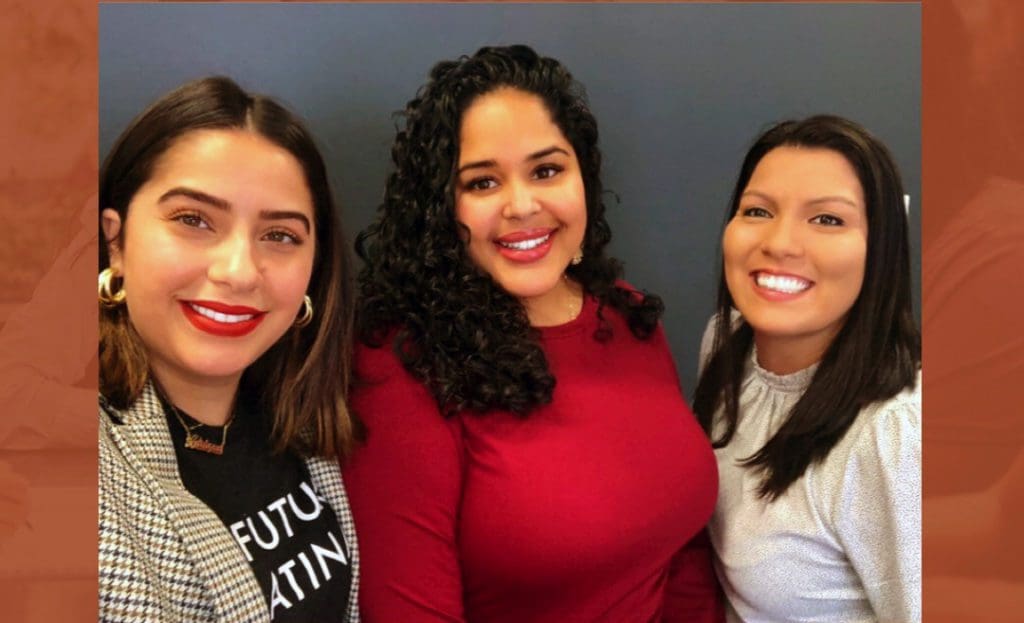“This college is wrong for me.” “I don’t belong.” “I’m not as smart or talented as everyone else here.”
Imposter syndrome, or perceived fraudulence, involves persistent feelings of self-doubt and personal incompetence despite an individual’s accomplishments. Women and people of color can struggle with these feelings in attending predominantly colleges or through making post-secondary plans.
Last month, PEF’s College Access Counselors Adriana Ongay, Christina Holiday, and Natalie Almiron presented strategies they recommend to their Latina students for overcoming imposter syndrome to the annual conference of the US Hispanic Leadership Institute (USHLI).
Why did you want to get involved in the USHLI conference?
Adriana Ongay: I attended this conference as an undergrad when I was a freshman and senior in college. This conference got in touch with my heritage and my culture. Being surrounded by other Latinos was empowering. Also, it encouraged me to pursue the route of public service and working with people, and I found my graduate school through the conference’s grad school fair. Speaking at the conference was a full-circle moment. It was really exciting.
What does the conference theme “Re-envisioning the Hispanicization of America” mean to you?
Natalie Almiron: For me, the conference theme means trying to take Latinos to the next level. Where we are as Latinos right now – who are we to higher education and society as a whole? The conference requested this workshop topic because it affects so many Latinos in so many different ways – not just in a professional setting, but in a college and in life.
What was your workshop about?
Christina Holiday: Our workshop was on a hot topic that a lot of people have been discussing lately: empowering young Latinas in high school and college and as young professionals. We talked about what imposter syndrome is, recognizing those triggers, how to combat it, and tips in general for mental health and wellness. We wanted them to challenge their cognitive distortions and stop viewing themselves as “fraudulent.”
What is the most effective way to combat imposter syndrome?
Natalie Almiron: What helps me combat imposter syndrome is social media because I can see the Latino community as a whole and people who are like me — having a master’s degree struggling with the same issue. It motivates me more to combat imposter syndrome, and presenting at a conference like USHLI is an opportunity to help Latino leadership tackle the syndrome.
Adriana Ongay: I struggled with anxiety rooted in imposter syndrome in graduate school. I looked to my professors who were women or people of color for support because I related to them the most. Knowing my professors had been in my shoes before — on many levels, not just graduate school — helped. Once the anxiety subsided, I had a clear view of what I was experiencing. It made me stop and ask myself, “Why do you think you’re so behind, or not capable?” I stopped comparing myself to others and focused on me. I reminded myself that I am successful. Getting my anxiety under control that was caused by imposter syndrome helped my mental wellness.
Christina Holiday: One of the best ways to combat imposter syndrome is taking inventory of your feelings and surrounding yourself with a strong support system. If you have a core group of people that you could go to for support, to ask for advice and for help, they will lift you. Your support system will remind you, “You earned this. You got here on your merit. You’ve been working hard.” People who can speak life into you and use those affirmations are one of the best ways to combat imposter syndrome.
What are the impacts you hope your workshop had on the attendees?
Christina Holiday: I hope we imparted confidence to the attendees of our workshop and encouraged them to believe in themselves, push forward, pursue their dreams and goals, and feel unstoppable. We all have potential and intrinsic motivation to move forward, but life happens. People’s reaction to those difficult situations builds character. The attendees should remind themselves that they are not alone, they are well represented at the conference and in the country as a whole, and they are valued.
— Interview by Lillian Huynh, Program Intern



